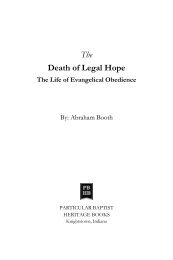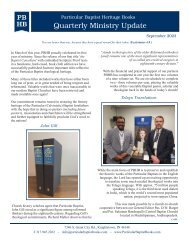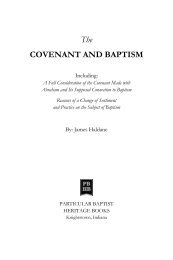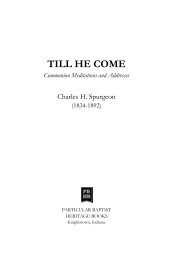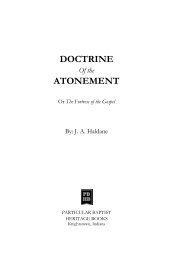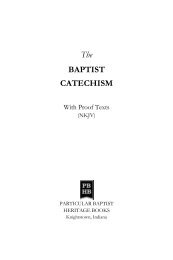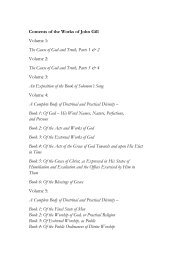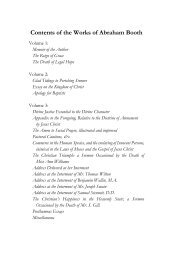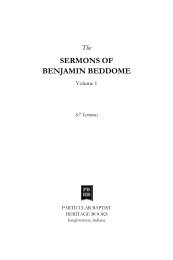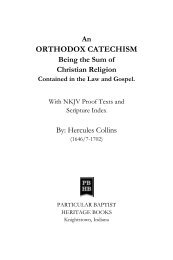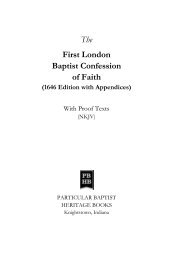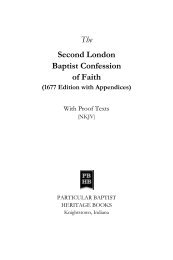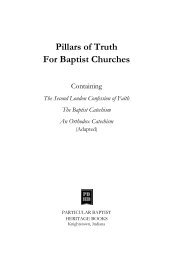the works of john gill vol2 SAMPLE
You also want an ePaper? Increase the reach of your titles
YUMPU automatically turns print PDFs into web optimized ePapers that Google loves.
Part 4: – A Vindication<br />
1. Justin Martyr affirms 51 , that “we were born sinners:” which words<br />
this man says in one place I have translated to a false sense; but in some<br />
pages after, when he had forgot what he had sail before, says, it may<br />
be translated ei<strong>the</strong>r way; ei<strong>the</strong>r “we were or were made, or were born<br />
sinners:” but be this as it will, <strong>the</strong> question, he says, will return, in what<br />
sense Justin uses <strong>the</strong> word sinners, as it is now <strong>the</strong> question between<br />
us, in what sense St. Paul uses <strong>the</strong> word, Romans v.<br />
I answer, Justin does not use <strong>the</strong> word sinners for sufferers, in which<br />
sense our modern Arminians, silly enough, make <strong>the</strong> apostle to use it<br />
in <strong>the</strong> above place; and I can scarcely think our author has front<br />
enough to assert this, when he reads <strong>the</strong> passage in Justin, which stands<br />
thus; “We, who by him (Christ) have access to God, have not received<br />
<strong>the</strong> carnal, but spiritual circumcision, which Enoch, and those like him,<br />
kept; but we, seeing we were born sinners, have received it by baptism,<br />
through <strong>the</strong> mercy <strong>of</strong> God.”<br />
2. Irenæus 52 has such a passage as this referred to by me, “Christ hath<br />
granted us salvation, that what we lost in Adam, that is, to be after <strong>the</strong><br />
image and likeness <strong>of</strong> God, we might receive in Christ Jesus;” which<br />
this man, after Dr. Whitby, would have to be understood <strong>of</strong> <strong>the</strong><br />
immortality <strong>of</strong> <strong>the</strong> body, which is only a part <strong>of</strong> that image; whereas<br />
Irenæus 53 elsewhere makes this likeness to be in <strong>the</strong> whole man, body<br />
and soul, and particularly to consist in <strong>the</strong> reason <strong>of</strong> man, and <strong>the</strong><br />
freedom <strong>of</strong> his will, which, he says, he has lost; his words are <strong>the</strong>se 54 ;<br />
“Man being rational, et secundum hoc similis Deo, ‘and in this respect<br />
like to God,’ and being made free in his will, and <strong>of</strong> his own power, is<br />
himself <strong>the</strong> cause why he may become sometimes wheat, and<br />
sometimes chaff; wherefore he will be justly condemned, because<br />
being made rational, he hath lost true reason; and living irrationally, he<br />
51 Dialog. cum Truph. p. 261.<br />
52 Adv. Hæres. 1. 3, c. 20, p. 282.<br />
53 Ib. 1. 5, c. 6, p. 441.<br />
54 Adv. Hæres. 1. 4, c. 9, p. 326.<br />
41




